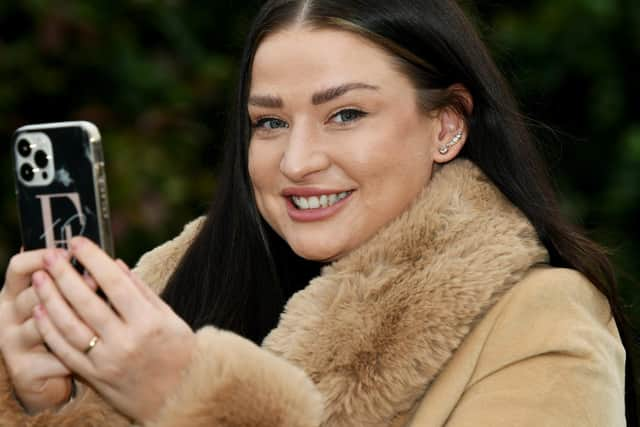Leeds blogger showing the real her instead of a fake life for social media gains 160,000 more followers
and live on Freeview channel 276
Emily Lucy Rajch had spent the last five or six years trying to forge her way as a blogger and influencer but always felt she was behind the trend, had to alter her photos to get the perfect image and was constantly fearful of the comments and online abuse she would sometimes get for her posts.
Ms Rajch would post pictures of herself wearing designer clothes, shoes and bags outside bars and hotels in Leeds, promote outfits she had been sent by brands as well as training hard to achieve the ideal body image.
Advertisement
Hide AdAdvertisement
Hide AdHowever, just weeks before the coronavirus outbreak in March, the qualified personal shopper, quit her job in social media and marketing and decided to be a content creator focusing on topics she wanted to.


In ten months since she has gone from having 25,000 instagram followers to more than 185,000 as well as 245,000 followers on Tik-Tok and 23,000 on her YouTube channel.
She said: "I was pretending to be someone else for so long and not doing what I wanted for the last ten years. Now it is the most freeing feeling.
"I copied what other bloggers were doing and doing what I thought people wanted to see, photoshopping photos to make my waist slimmer, get a dress and put it on and get followers. Every weekend I would shoot outside Dakota and thought 'I am doing it'.
Advertisement
Hide AdAdvertisement
Hide Ad"I got 20,000 followers but it never grew, I was constantly comparing myself to people doing really well. It is stuff that was not me, I wanted to use my skill set but could not figure out how to do it."


After taking the plunge and quitting her job she became an online midsize personal shopper, started doing videos which reduced the need to take and edit photos and is now working with brands, such as Gymshark which is known for having very slim athletic influencers, on a monthly basis to change the stereotypes of body image on social media and influencers in general.
Ms Rajch said: "When COVID hit I thought no-one will work with me but it gave me the platform to create content I wanted to. There was no rat race, there was no worry about getting invited to an event, no-one was creating content. It gave a moment for people like me to come on board and just be real."
However, Ms Rajch admits she felt fearful that people would realise she had been editing her photographs and call her out on it, both in person and online - but those fears proved unfounded.
Advertisement
Hide AdAdvertisement
Hide AdShe added: "I have been trolled and and people have said negative things about me like I look fat and I will never fit into things and I used to let it bother me but now I have said I will show you my body how it is, there are no surprises and this is what I look like. There were more people engaging in my posts and liking what I was doing for being the real me. It is the most freeing feeling and I very rarely get trolled. They can't say something I have already said about myself."
It comes as others take a break from social media for their own well-being for various reasons - to block out trolling or to stop comparing themselves to others who seemingly have the 'perfect' life in pictures.
Deborah de Vittoris, of events company Pink Gorilla and Hairy Lemon, has been working in the city's hospitality and promotion industry for 20 years and has seen changing trends and behaviours. She says instead of having the most fun on a night out she is now seeing people trying to portray the best lockdown life.
She said: "At the beginning of lockdown people were a lot nicer and I did notice a lot of people that weren't as active (on social media) being more active. People had more time on their hands, weren't working and on furlough. The positives were people reaching out that hadn't seen each other in years and businesses thriving on it.
Advertisement
Hide AdAdvertisement
Hide Ad"People have taken a different approach. Ten months ago everybody posted about their holiday to the Maldives or designer handbag, now it is about walks in the Yorkshire Dales or their new puppy - who has the biggest Christmas tree?
"I don't think it (social media) is going away, people are adapting what they post. I watched a reality programme and they said 'if it is not on instagram, it didn't happen'. A girl could take a selfie in a gym but they might have only been there for five minutes.
"There are positives and a lot of negatives, it depends what your state of mind is. I look at the Christmas trees and don't wish I had one, they are a pain, but a young girl might think 'will I ever be able to afford that."
People's state of mind in relation to social media is even the subject of academic focus at the University of Leeds.
Advertisement
Hide AdAdvertisement
Hide AdDr Cathy Brennan is an associate professor in psychological and social medicine, with expertise in self-harm and suicide.
She said there is a tendency to lump all forms of social media into one monolythic system but people take different things from different platforms,a and, that further studies and research show that bullying and trolling type activities have the same effect in real life as they do on social media - except that it is amplified and seen by more people.
Stepping away from social media, she added, would have implications for people with mental health issues who use it as a support network and also stifle debate.
Dr Brennan said: "On a personal level it is good to take a step back, go for a walk outside and appreciate the things around you. It seems to be overwhelmingly women and non white people that get the abusive stuff and the worry about stepping back is you lose the diversity of voices. It is a fine line, you want to promote debate where people are allowed to question what people say. We have lost the art of discussion.
Advertisement
Hide AdAdvertisement
Hide Ad"It is a generational thing. For older people it is easier for them to take a step back. For younger people who have grown up with it, it is the way they communicate with people, even friends down the road. Taking a step back does not make sense to a lot of people. Things evolve but our understanding does not expand with the technological advancements. That is where we need to focus."
Comment Guidelines
National World encourages reader discussion on our stories. User feedback, insights and back-and-forth exchanges add a rich layer of context to reporting. Please review our Community Guidelines before commenting.